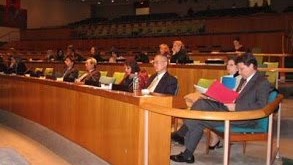The Committee of Experts on Public Administration held its sixth session at the United Nations in New York from 10 to 13 April 2007. Its theme was “Participatory governance and citizen engagement in policy development, service delivery and budgeting”.
Report
Arabic | Chinese | English | French | Russian | Spanish
CEPA's Conclusions for the Annual Ministerial Review
Subtopics | Major recommendations/conclusions |
|
Policy development; Service Delivery; Budgeting and public accountability | Member States should reaffirm and deepen participatory governance and citizen engagement, and instigate the necessary capacity-building initiatives, while continuing to include the cross-cutting issues of governance and public administration, and particularly participatory governance, in the implementation of IADGs and the MDGs. The Secretariat should: - ensure that the normative, analytical and technical cooperation elements of the United Nations Programme in Public Administration and Finance continue to include participatory governance and citizen engagement in policy development, service delivery and public accountability;
- strengthen its partnership with other international and regional organizations, particularly civil society groups, in carrying out its work on participatory governance;
- prepare and circulate a policy brief on the main theme in consultation with the lead speakers.
|
|
Annual Ministerial Review Theme | Major recommendations/Conclusions |
|
Strengthening efforts to eradicate poverty and hunger, including through the global partnership for development | Member States have already made interventions on many levels with respect to the achievement of the MDGs, including on: - (a) international financial and trade policies for economic growth;
- (b) national-level redistributive policies for social objectives;
- (c) mobilizing and deploying resources for implementing new programmes and stepping up existing ones; and
- (d) making governance and public administration more responsive, efficient and effective in implementing poverty alleviation initiatives. In the time left, it would be helpful to focus on how to strengthen the capacities of individual countries rather than on failures. In addition, the introduction of regional initiatives, such as the New Partnership for Africa’s Development, could also assist.
Key aspects of cross-cutting governance and public administration should be brought to the notice of the Council, such as the importance of: - (a) effective rule of law and a legal framework that encourage productivity, entrepreneurship and competitive markets, and which also sanction rent seeking, monopolies and speculative risk-taking;
- (b) efficient public institutions and processes that provide predictability of results;
- (c) building a leadership capacity for creating consensus on a common agenda; and
- (d) public servants with a minimum level of professionalism that prevents delays in the implementation of key policies and programmes. The complexity of dealing with corruption, or perceived corruption, in key areas for economic growth, such as taxation, customs, procurement and contracting, was also raised.
|
 Добро пожаловать в ООН!
Добро пожаловать в ООН!
